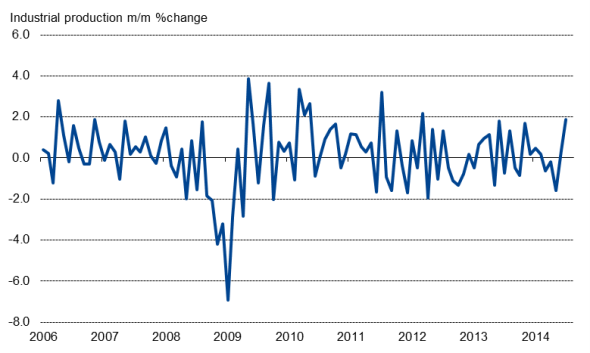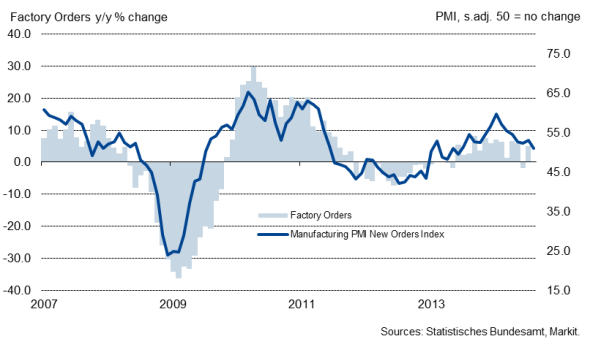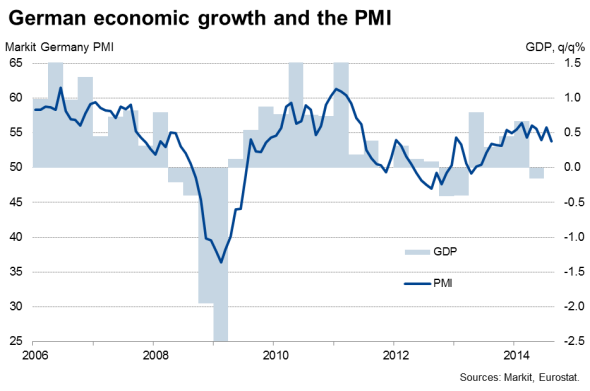Customer Logins
Obtain the data you need to make the most informed decisions by accessing our extensive portfolio of information, analytics, and expertise. Sign in to the product or service center of your choice.
Customer Logins
ECONOMICS COMMENTARY
Sep 05, 2014
German industrial production rebounds in July, bodes well for third quarter

German industrial production increased for the second successive month in July and factory orders rose at the sharpest rate in over a year, suggesting that the sharp declines seen in May were only a temporary soft spot, rather than the beginning of a substantial downturn in manufacturing.
Industrial output beats expectations
Industrial production rose 1.9% in July, according to the Federal Statistical Office (Destatis). Economists polled by Reuters had expected a mere 0.3% increase. The solid rise in industrial production was the sharpest in over two years and follows a revised 0.4% increase in June (previously reported as +0.3%).
Even more encouraging was a sign that business investment picked up. Destatis reported that capital goods manufacturers saw the steepest rise, with production in the sector up 5.0%. Intermediate goods output meanwhile rose 0.8% and the production of consumer goods increased 0.1%. Energy production fell 3.7% on the month, however, but construction was up 1.7%.
With the exclusion of construction and energy, manufacturing output was up 2.6%, the largest monthly rise in three years.

Factory orders surge in July
The upturn in production followed a surge in new orders. Official data released on Thursday showed that factory orders rebounded by 4.6%, having dropped 2.7% in June. The increase was the steepest since June 2013. While domestic orders increased 1.7%, new export work jumped by 6.9%, showing resilience to the geopolitical tensions in Ukraine and the Middle East.

Official data and PMI point to GDP rebound in third quarter
Both PMI results and official data therefore now bode well for a rebound in gross domestic product in the third quarter, after GDP contracted 0.2% in the three months to June.
The official data follow survey data which suggest the German economy has been growing at a reasonable, albeit unspectacular, pace so far this year. The Markit/BME Manufacturing PMI has consistently been in expansion territory since July 2013. Despite weakening in recent months, the data are still consistent with growth in Germany's goods-producing sector, sending positive signals for the health of the economy in the third quarter. The German services sector has also been growing steadily so far this year, according to the PMI.
A key difference between the PMI and official data has been the relative weakness of the latter in the second quarter. While survey data sustained its growth trend, official data showed contraction in the March-May period. However, this weakness of the official data in the spring relative to the PMI looks likely to have been caused by the former being affected by a greater than usual number of holidays being taken around public holidays.

Oliver Kolodseike | Economist, Markit
Tel: +44 14 9146 1003
oliver.kolodseike@markit.com
{"items" : [
{"name":"share","enabled":true,"desc":"<strong>Share</strong>","mobdesc":"Share","options":[ {"name":"facebook","url":"https://www.facebook.com/sharer.php?u=http%3a%2f%2fwww.spglobal.com%2fmarketintelligence%2fen%2fmi%2fresearch-analysis%2f05092014german-industrial-production-rebounds-in-july-bodes-well-for-third-quarter.html","enabled":true},{"name":"twitter","url":"https://twitter.com/intent/tweet?url=http%3a%2f%2fwww.spglobal.com%2fmarketintelligence%2fen%2fmi%2fresearch-analysis%2f05092014german-industrial-production-rebounds-in-july-bodes-well-for-third-quarter.html&text=German+industrial+production+rebounds+in+July%2c+bodes+well+for+third+quarter","enabled":true},{"name":"linkedin","url":"https://www.linkedin.com/sharing/share-offsite/?url=http%3a%2f%2fwww.spglobal.com%2fmarketintelligence%2fen%2fmi%2fresearch-analysis%2f05092014german-industrial-production-rebounds-in-july-bodes-well-for-third-quarter.html","enabled":true},{"name":"email","url":"?subject=German industrial production rebounds in July, bodes well for third quarter&body=http%3a%2f%2fwww.spglobal.com%2fmarketintelligence%2fen%2fmi%2fresearch-analysis%2f05092014german-industrial-production-rebounds-in-july-bodes-well-for-third-quarter.html","enabled":true},{"name":"whatsapp","url":"https://api.whatsapp.com/send?text=German+industrial+production+rebounds+in+July%2c+bodes+well+for+third+quarter http%3a%2f%2fwww.spglobal.com%2fmarketintelligence%2fen%2fmi%2fresearch-analysis%2f05092014german-industrial-production-rebounds-in-july-bodes-well-for-third-quarter.html","enabled":true}]}, {"name":"rtt","enabled":true,"mobdesc":"Top"}
]}



